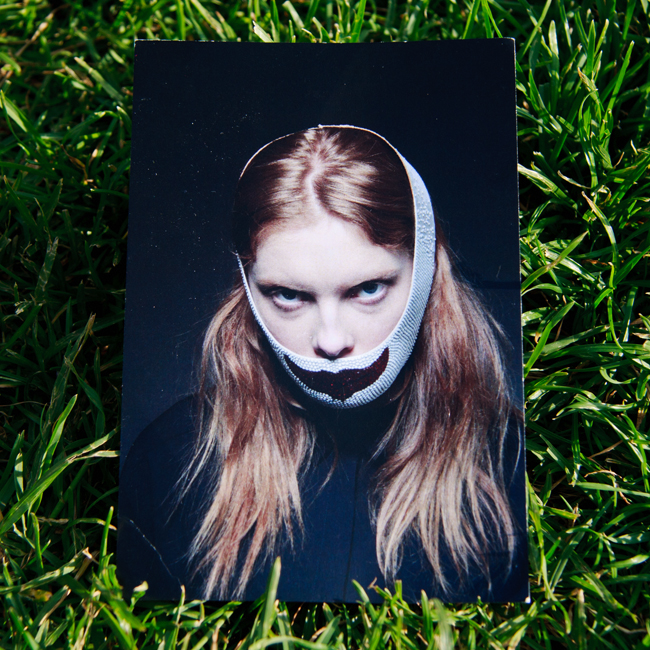I managed to see to a few of the University of The Arts graduation shows this summer. Of all the shows visited, the Central Saint Martins
degree show was by far my favourite. The students here displayed a rich set of ideas and techniques in their work which made the viewing
experience memorable and less predictable.
Another bonus was finally getting to visit the new CSM academic building which is located by the canal in Kings Cross. The multi-coloured
water feature and painted facade create an incredible first impression. Stepping into the main foyer has a grand and awe inspiring feel similar
to the entrance of the Tate Modern's Turbine Hall, only here the feel was a lot less stuffy. It's no wonder the students create such good work
as they have this great environment to welcome them everyday.
Below are some of Nino's favourite works picked from the BA Textiles and Jewellery courses.
Caroline Anguiulo's installation Mind Wandering Bloom was all about encouraging creativity through daydreaming. A range of colourful plastics
were twisted into a variety of abstract forms and haphazardly arranged around a table. Each individual piece was an instinctive response to a
fleeting burst of inspiration and aimed to reveal something about the individual's current state of mind.
I though the austerity theme explored in Katie Thomas textiles was really interesting. For her textile collection she uses a stark colour palette
and graphical patterns often favoured by budget supermarkets and co-opts them into her knitted designs. The effect is unexpectedly vibrant
and playful rather than stale or sombre.
The accompanying photographs for this collection have a really eerie mood to them which reminded me a bit of the final scene in Ira Lenvin's
The Stepford Wives. They Live and Repo Man are other obvious movie references, especially evident in the set design. Like all those movies,
Thomas's work shares a similar dark humour and a surreal edge which I found very pleasing.
Roisin Johns creates all of her work using objects salvaged from bins and skips. They are then embellished with paint, dyes, studding and
other adornments before being molded into a final shape. The result is a colorful collection of absurdist jewelley which defy any logical
understanding. I thought John's work was incredibly inventive and perfectly demonstrates how an imaginative mind can transform any object
into a desirable piece of art.
Akiko Shinzato was the winner of the 2015 Swarovski Design Award. Her winning piece Clown is a leather face mask studded with Swarovski
crystals. I love the slightly sinister and fetishistic nature of this piece and thought Barney McCann did an excellent job of capturing that mood in
the accompanying photographs.
Birgit Toke Tauka Frietman's work was my absolute favourite of all the jewellery collections. Her body pieces, which resembled luxury torture
devices, are made of a lush combination of wood, suede, wool and velvet. The smooth and elegantly curved shape of the wood was achieved
byusing a steam molding process usually used in furniture production.
Birgit's combination of industrial techniques with traditional hand crafting made her work appear strangely delicate and robust at the same time.
I thought this curious mix of ideas was very seductive and spent an age admiring the sculptural beauty of each individual piece.
Kota Okuda, like BTTF (girl above), was also interested in fusing disparate techniques to create her work. In this case, the idea was to fuse the
contrasting traditions of Scottish and Japanese tribal-wear to create a hybrid style reflecting her cultural identity. The result was an impressively
robust collection of wooden headdresses. At first glance I thought Okuda's work appeared quite plain and unpolished compared to other things
on display. However on closer inspection I began to notice more of the details such as the intricate hand carved patterns in the wood, the leather
paneling and also the inlaid Swarovski crystals which I mistakenly thought was thread. The rustic look was quite deceptive on this occasion and cunningly disguised a lot of the skill that had obviously gone into creating these pieces.
contrasting traditions of Scottish and Japanese tribal-wear to create a hybrid style reflecting her cultural identity. The result was an impressively
robust collection of wooden headdresses. At first glance I thought Okuda's work appeared quite plain and unpolished compared to other things
on display. However on closer inspection I began to notice more of the details such as the intricate hand carved patterns in the wood, the leather
paneling and also the inlaid Swarovski crystals which I mistakenly thought was thread. The rustic look was quite deceptive on this occasion and cunningly disguised a lot of the skill that had obviously gone into creating these pieces.







No comments:
Post a Comment